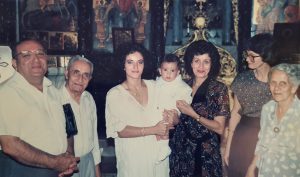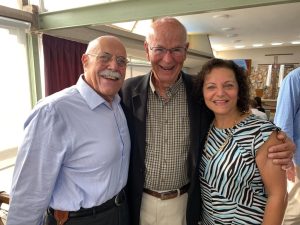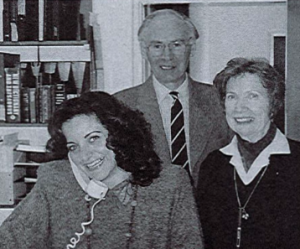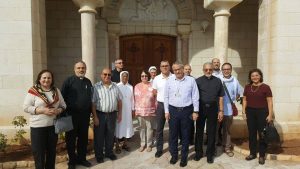The Nazareth Hospital has been part of Nana’s life ever since the day she was born. She was not only born there, just like her mother, but also gave birth to her three sons there.
Her maternal grandparents lived in a house between the hospital and the Anglican cemetery where Dr Vartan and his children are buried. Nana would often visit them in the afternoons when they would be hosting teatime following Arabic lessons to the expatriates who worked at the hospital. Her grandparents also had the honour to meet all hospital directors as far as Dr Bathgate. Nana’s mother also became a committed volunteer since 1982, and later the coordinator of the volunteer ladies’ group.

Najla (third from the left) holding her son with her parents, her grandparents and Jenny Coward, a friend with the essence of a sister, in the Greek Orthodox Church in Nazareth.
Sometimes people ask her: “Do you know this person who worked at the hospital a long time ago?” And she says: “Yes, I know them, but not from working at the hospital. I met them because they became friends with my grandparents and aunt.”
Back in 1986, I had a job and was studying tourism in college. My aunt, Wajeeha, my mother’s sister, who worked at the Nazareth Hospital as a medical secretary; was the reason I came here. She said: “They need someone with your skills who can enter data at the computer”. At that time, this wasn’t common at all. I said: “Me? Work in a hospital? Who will want to work in a hospital?” I thought of a hospital as a place that is full of illness. I wanted to travel the world, but my aunt kept insisting every time we met and telling me: “Come, come, apply for the job!”. Later I understood that her insistence came from her faith. She is a strong believer and wanted me to be in an atmosphere where I could build relationships with other Christians.
I was raised in a Christian home, never missed Sunday School and church services, and I also went to the Baptist school in Nazareth. But after school graduation, I started university in Haifa, and worked in Haifa, and suddenly Sundays turned into work days, and Christmas is not Christmas anymore. You have to work and study. And I think she saw me withdrawing from Christianity. I didn’t have a community around me. And that’s the reason she kept insisting. I said: “Okay, I’ll apply for the job.” Deep down in my heart, I had made my decision: I’ll take three months’ leave and try the hospital job. And at the end of this trial period, I would say: “I tried it, but I don’t like it. Now I can get back to my old job.” However, when I started working at the hospital, I met fantastic people and felt like I was doing something good for a well-deserved institution: I felt really appreciated. Within a few weeks, I felt like I was in the right place. I thought: “This is where I want to be.” It totally switched my thinking, and here I am, almost 36 years later!

From left to right, Dr Nakhle Bishara, Dr Robert Martin and Najla Hamati
I started my career at the hospital as a data person. At that time, the hospital didn’t have any computers, so my job was to enter patients’ data so that there would be data in the computers when they would be available for staff. After a while, we had a new General Director from the United States – Dr Robert Martin-, who started his role being assisted by his PA, Ms Jennifer Coward, both from the USA. A few months later, Dr Bob and Jenny realised they needed somebody who spoke Hebrew and Arabic to help with administrative work. For example, the correspondence with the Israeli authorities gradually changed from English to Hebrew. The hospital’s administrator at the time put my name forward, and I started helping with the Hebrew and Arabic correspondence, as needed, two or three days a week. Gradually, the work expanded, and I started working full-time alongside the American secretary. When Jenny’s term came to an end, and she left back to the States, I took over as the personal assistant for Medical Director, Dr Nakhle Bishara and CEOs, such as Dr Bob Martin, Anthony Holt, etc. Eventually, and as work expanded, I became the Administrator for the Medical Risk Management and the Helsinki Committee. Now I am entirely focused on medical risk management.

Administrative assistants Najla Hamati & Joan Clark with Mr Anthony Holt
Risk management is a field that has expanded a lot throughout the years. When I was the assistant to the medical director, it was only four or five small files in a drawer. Today we occupy offices and stores. The tasks vary and sometimes seem endless. The major part of my job is dealing with legal cases. I work with two big legal companies, one located in Herzilya, and the other, in Tel Aviv, both represent the hospital legally. I am also involved in the work with our Insurance companies. I, together with my manager, Dr Helo, who is also a lawyer, and with the patient safety nurse, Eman, hold monthly meetings with all the heads of departments and in-charge nurses to review incident reports for learning purposes, and always aim to promote patient safety.

Najla (far right) visiting sick patients in the three hospitals in Nazareth with other Pastoral Care members
Being part of a community and feeling that you are serving a well-deserved institution.
The spirit in the hospital is unique. For example, the recent dialysis department expansion ceremony was very touching for me. This morning, I was telling Enas, our PR personnel, that we come to the hospital, we do our part, and sometimes we are disappointed or discouraged by challenges. However, in the long run, people come, do their part and leave, not knowing what their role has contributed. Still, it’s a continuous non-ending circle: the institution not only remains throughout challenges, but it also grows.
I met the late Rev Shafiq Farah a long time ago. I was working at the Director’s office, and he always came to visit. When he wrote his book What Shall I Do With My Life? I translated one chapter into Arabic. The hospital didn’t have money to translate the book, so they gave a chapter to each one of us who spoke English well to translate it into Arabic. His support to the hospital then, is being carried by his son, and It’s very touching to see the continuation of the work. God keeps our hospital in His care throughout generations.
The hospital gives so many crucial services to the people of Nazareth. When my son was unwell a month ago, I couldn’t imagine me taking him to a different hospital if we didn’t have this unique hospital. It’s a place that you rush to when you are in urgent need of help. It’s hard to imagine Nazareth without this hospital.